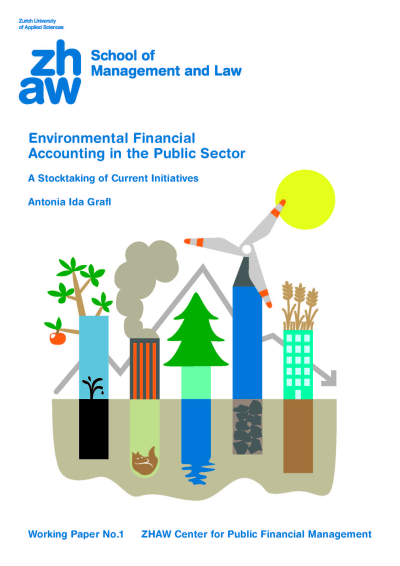
Posted by Antonia Ida Grafl[1]
The World Economic Forum’s Global Risk Report 2020 reveals that climate-related events are the top five global risks – extreme weather, climate action failure, natural disasters, biodiversity loss, and human-made environmental disasters. Climate action failure is the most critical risk. An adequate and urgent policy response is needed to protect the earth's environment and ensure a healthy planet. Governments worldwide are increasingly aware of the gravity of these risks and are taking action to combat climate change, as stipulated by the UN’s Sustainable Development Goals and the Paris Climate Agreement. There is broad consensus among PFM experts that climate change will have a material financial impact on public sector (and private) entities. Linking environmental data with financial management information systems is one way to make transparent the consequences of global warming and help governments make climate-informed decisions.
Including environmental concerns within annual reports is increasingly considered best practice, at least in the private sector. There is a growing demand amongst big investors, such as Blackrock, HSBC, Vanguard, and Superfund for climate-sensitive reporting to give a true and fair view of the financial position and performance of their businesses. Environmental Financial Accounting (EFA) enables companies and governments to report on their exposure to, and management of, the financial and non-financial impacts of climate change. This approach was first developed in 1998, following the Financial and Accounting Report on Environmental Liabilities and Costs prepared by a UN Intergovernmental Working Group of Experts. Yet while EFA is gaining ground in the private sector, its conceptualization and use in the public sector is much less developed.
Nevertheless, progress is being made to improve the accounting treatment of environmental risks in the public sector. Available guidance ranges from recommendations on the disclosure of high-level information on how entities are affected by environmental risks, to synoptic overviews on the application of existing accounting standards. The IPSASB Natural Resource Project is developing accounting standards for living resources, subsoil resources, and water. This project will provide an important input to environmental sustainability. However, a comprehensive, synthesized, public sector-specific approach – providing potential users with guidance on how to put EFA into practice - is still lacking. A recent working paper by the ZHAW Center for Public Financial Management “Environmental Financial Accounting in the Public Sector” takes stock of current initiatives and discusses how to develop public-sector EFA further.
This study recommends building on existing accounting standards as a pragmatic way forward. Many generally accepted recognition and measurement principles could be applied in the context of environmental accounting. IPSAS is the primary reference framework in public sector accounting and provides a suitable starting point. The IPSASB Natural Resource Project will complete the repertoire of accounting standards relevant for EFA since it addresses accounting for ecosystem services, currently not covered by IPSAS literature. A separate EFA framework is likely to be counterproductive, as it could overburden the reporting process and inflate compliance costs. However, efforts should be made to harmonize the IPSAS framework with well-established EFA guidance, such as the high-level disclosure recommendations of the Task Force on Climate-Related Disclosures (TCFD).
The ZHAW paper observes that disclosing high-level information on how entities are affected by climate change is increasingly accepted, while the measurement and recognition of the financial impact of climate-related events is still rare. This could be explained by difficulties in obtaining reliable data and the challenges of measurement. Consequently, additional practice-oriented guidance is needed. The preparers and auditors of financial statements must deal with highly technical issues requiring specific skills when evaluating how to account for climate-change-related events, their underlying scenarios, and the ultimate consequences.
According to the ZHAW report, efforts should not stop at disclosing climate-related risks along the lines of the TCFD recommendations. All material non-financial and financial information on climate change issues should be recorded in public-sector entities' General Purpose Financial Reports. Governments worldwide need to take immediate action, and comprehensively "greened" financial statements will serve as a robust management tool for ecologically informed decision making.
Links to relevant documents are listed below:
- ZHAW Center for Public Financial Management Working Paper: https://www.zhaw.ch/storage/shared/upload/Environmental_Financial_Accounting_in_the_Public_Sector.pdf
- WEF Global Risk Report 2020: https://www.weforum.org/reports/the-global-risks-report-2020
- TCFD Recommendations: https://www.fsb-tcfd.org/recommendations/
- Climate Change – Relevant IPSAS Guidance : https://www.ipsasb.org/publications/climate-change-relevant-ipsasb-guidance
- IPSASB Natural Resource Project : https://www.ipsasb.org/consultations-projects/natural-resources
[1] Senior PFM Expert and lecturer at the Zurich University of Applied Sciences, Center for Public Financial Management.
Note: The posts on the IMF PFM Blog should not be reported as representing the views of the IMF. The views expressed are those of the authors and do not necessarily represent those of the IMF or IMF policy.





